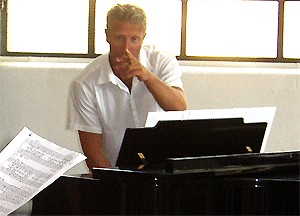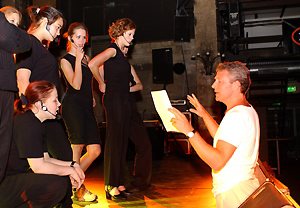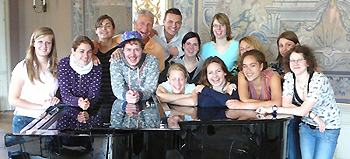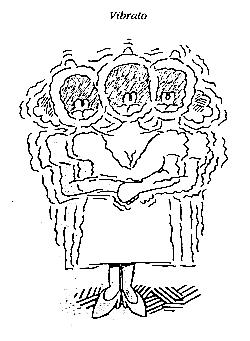Training your voice
preparing for the creative moment

From traditional to metaphysical
I have been coaching singers, choirs and vocal groups for more than 35 years. Through my own studies as a singer and choir conductor at The Royal Danish Academy Of Music, I used to think that teaching others must be easy enough.
Well.. eventually I have become comfortable in almost any coaching situation but God knows it wasn't always like that. Only within the last say 10 years have I become aware of what really happens when we sing. It has been a surprising but relieving experience for me.
Exercises ground your spirit in the body
Training your voice through exercises is a way of making sure that your voice stays in shape and gets stretched within its natural physical limits on a regular basis. This provides the best basis for the soul to come through when you most want it to. Vocal fitness is no different than what is true for the whole body. However the voice muscles, although active every day - are most often not challenged to their full vocal capacity, but rather kept in a relatively narrow range of expression.
Why is that? Well.. for social reasons mostly. If you are not exactly a singer or performer, you will often go through life "fitting in" rather than expressing your every feeling out loud and clear at all times. We all begin life as babies by expressing our every need vocally with extreme dynamics.. but after a few years we begin to conform and reduce the "natural output".
On some level this helps us socialize, but it very often has a strong impact on how willing and ready we are later in life to express ourselves and "sing our hearts out". Believe me it's a bigger deal than we often think.
Physical training of the voice goes beyond the mere exercising. It's also an emotional preparation for a healthy, strong and clear expression. Learning to "stand for yourself" when your full voice comes out. And particularly as a singer.. training provides physical surplus that translates into spiritual freedom. Therefore, exercising your voice is indeed a preparation for the special moments of creative expression.
Anders does not offer private sessions at this time

Technique
To be quite frank - technique as such does not interest me very much. It's what it does for the singer's expression that lights my fire.
You might wonder.. can I learn to sing? Well.. in my view anyone can sing. That's not something you need to learn.. we are all born singing. Every child sings out loud and will continue if it is allowed its free expression.
The question more precisely put is often.. "can I learn to sing professionally?" And that's a whole different ball game. Of course there is merit in training your voice for the fun of it and perhaps more personal well-being. This is highly valid and I strongly encourage anyone to do so who feel like they want to re-connect with their childhood's carefree ability to just sing out loud.

However describing what it takes to be a professional singer covers so many questions I have met over the years about how to improve performance and get more surplus in concert situations or in the studio.. often at late hours.
F.A.Q.
You might wanna check out my Frequently Asked Questions where you are likely to find answers to some of your questions on voice training and singing.
Talent
Talent is a gift. All that means is that it's something you can do easily - without much effort. It comes naturally to you. The word "natural" here is very important. However just as talent is a necessary component in becoming a professional singer - so is a basic training of the voice.
When performing in front of an audience you wanna have surplus - and not just barely what it takes to get through. Out of surplus comes creativity. So you could say - through exercising the voice regularly, you prepare youself for the creative moment.
So learning to sing can be described on three levels:

Physical
Training your vocal muscles for endurance and better performance. The more free your voice is the easier it is to "sing your heart out" .. not having to think too much of technique in the middle of your song. Singing for a living requires a strong voice and vocal awareness, whether you are into rock, R&B, pop, soul ..or wish to pursue a career singing classical music.
Esthetical
Esthetics include a musical knowledge, e.g. your understanding of timing, phrasing and style.
Metaphysical
Creating the magic. The "thing" that must be there, which is not so easy to explain. In other words..bringing that special intense quality of singing that touches everyone who listens.
"Vibrato: A technique used by
instrumentssaid to add warmth to
the tone and used by singers to hide
the fact that they are on the wrong pitch"
More on metaphysics
My experience concerning the metaphysical aspect of singing - is that we train the muscles and tune our voice as an instrument so that we can "let go and let God". Meaning.. a well trained voice allows the spirit to come through that much easier, because there's nothing technically to disturb the spiritual connection from expressing itself.
In an ideal "uncluttered" singing situation a singer moves from the craft - via an understanding of the aesthetics - gracefully into a metaphysical expression which has the potential to touch everyone present at more levels than meets the eye or rather the ear.
Metaphysical means above or beyond the physical. I believe that everyone of us has a soul or spirit that holds the greater truth about who we really are. When we sing with no technical boundries the sound connects the spirit part of the singer with the spirit part of all those who listen - and thus the metaphysical experience is happening. A connection beyond the physical is made.